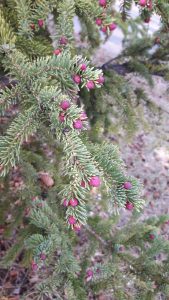Module 1: The Global and the Local in Indigenous Knowledge
Entry 2: Foundational Knowledge Resources for Educators
I want to take the opportunity to share 3 resources that have been provided to me as an Alberta educator. These resources have been helpful to me on my learning journey and I respect that they have been developed in partnership with Indigenous Elders, Knowledge Keepers, and our educational and professional institutions. These specific resources are focused on the Indigenous communities located within Treaty 6, 7, 8 lands. They are very extensive and are not meant to be consumed in one sitting, but they will be important to my learning this semester. As a student of this course, tasked to research a specific question related to Indigeneity, education and technology, I view building my foundational knowledge related to Indigenous ways of knowing as paramount to my ability to complete my research task.
Here is a brief overview of each resource in the order that I have used and will use them in my journey.
- Education is our Buffalo. This thorough resource was published by our provincial teachers’ association and was my introduction to Indigenous Foundational Knowledge in Alberta when I started teaching here. This book helped me to build an awareness of the worldview, ways of life, and traditions of Indigenous people who live, work, and play in an area that was new to me. The value to this resource for me was giving me some confidence as a non-Indigenous educator.
- Walking Together, Learn Alberta. This extensive website developed with Indigenous leaders and Alberta Education provides foundational knowledge for educators through a dozen topics that are explored through four phases: Beginning together, Respecting wisdom, Observing practice, and Exploring connections. The value of this website is elevated by the videos of Elders and Knowledge Keeps speaking on topics that range from wolview to Residential Schools to Pedagogy. Our school and city does not have a connection to a First Nation and as such does not have Elders who can visit our schools. This is one way technology can support my students by letting them hear the wisdom of these Elders. I will be using this resource this year.
- Stepping Stones. Our provincial teachers’ association has been working with Elders and Knowledge Keepers to develop resources to assist educators in taking steps to develop their foundational knowledge. Each publication on topics ranging from Elder Protocol, to Alberta Metis settlements to the Sixties Scoop is intended to help educators move one step further along their path of building foundational knowledge. These resources are used at PD sessions that I attend regularly.
The significance of these foundational knowledge resources has become apparent to me since exploring the Indigenous connection to the land juxtaposed against the individualism that is promoted through the use of technology (Bowers et al., 2000) in Module 1. I have shifted the way I am viewing this professional learning from a “course I have to take” to a “journey I will travel along a path” to help increase the authenticity of this experience.
References
Alberta Education (n.d.). Walking Together: First Nations, Metis, and Inuit Perspectives in Curriculum. https://www.learnalberta.ca/content/aswt/
Alberta Teachers’ Association (n.d.). Education is our Buffalo: A Teacher’s Guide to First Nations, Metis, and Inuit Education in Alberta. https://www.albertaschoolcouncils.ca/public/download/documents/55705
Alberta Teachers’ Association (n.d.). Stepping Stones Series.https://www.teachers.ab.ca/For%20Members/Professional%20Development/IndigenousEducationandWalkingTogether/Pages/Resources.aspx
Bowers, C.A., Vasquez, M., & Roaf, M., Native People and the Challenge of Computers: Reservation Schools, Individualism, and Consumerism. American Indian, 24(2), 2000, 182-199.

 Public Domain photo by Shutterstock
Public Domain photo by Shutterstock